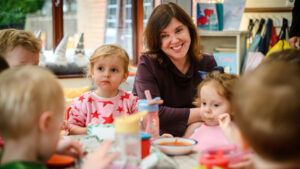As Children’s Commissioner, I get to hear from children every day about their ambitions, their experiences and the people or things in their lives that make a difference.
It is my job to listen deeply – and reflect what they tell me truthfully to those in positions of power: politicians, policy makers, the adults in charge.
What children have told me over the last three years has resulted in a positive vision to improve their experience of childhood, The Big Ambition. This vision has been shaped by the voices, views and experiences of the more than one million children I have heard from since becoming Commissioner.
It’s with those million voices ringing in my ears that I say: this election must put children’s experiences at its heart.
Only one in five of those who responded to The Big Ambition survey said they agreed that people who run the country listened to what they had to say.
As their Commissioner, but also as a former headteacher, teacher and a parent, this is really frustrating, because despite this disheartening statistic, children aren’t disillusioned. This generation is ambitious, optimistic and they have faith that the adults in charge can make great change happen – but only if their views are taken seriously.
That means that when the national conversation turns to things like housing, we should be thinking about what it’s like for a child living in a B&B who has to move schools in the middle of the year, not just about mortgage rates or getting a foot on the housing ladder. When it comes to ending poverty, the discussion turns to benefits and income tax, but must reflect what it feels like to be a child wondering whether they’ll have food on the table for dinner and witnessing their parents’ exhaustion from working two jobs.
If we don’t include their voices when it comes to elections, manifestos, and promises from their local MPs, children feel invisible.
These are children who have witnessed a global pandemic, a war in Europe, and an increasingly complex online world. Many will become adults under the next government. Their contributions to this debate matter.
I have challenged politicians to listen and act on what children have told me; what they want from their schools and teachers; what they need to thrive into adulthood; what they wish for in their family lives.
Today I’m raising the stakes. I want every party leader to hold a debate for children before election day.
I want every manifesto to consider how its pledges impact children’s lives, their families and their futures.
And I want our future government, whoever it is, to give children every opportunity to represent their views in person: to parliamentary committees, at MP surgeries and through student voice councils.
With more than 1.4 million children missing at least 10% of school, one million children awaiting referral for mental health treatment and children as young as nine accessing harmful sexual material online, they deserve to be listened to more than ever.
Children may not have a vote, but they deserve a voice.






